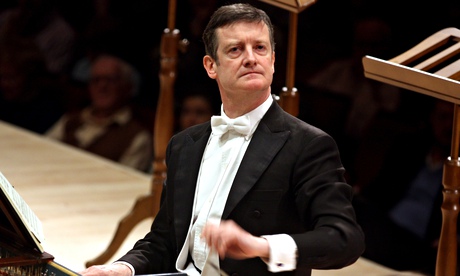
No one other than Bach knows why, after a lifetime’s service of the Lutheran church, he chose to spend his final years assembling a Latin mass of such stylistic grandeur and exceptional length that it could never be performed as part of any service. Was the B Minor Mass intended to stand as a form of musical last will and testament? Or was it, more prosaically, a compilation work with its roots in an unsuccessful job application to the Dresden court and a means of preserving his most cherished cantata movements from being used as firelighters? All one can know for certain is that, by drawing on the polyphonic styles of his predecessors, Bach created one of the most epic spiritual journeys in music.
At over 100 minutes, Harry Bicket’s performance with the English Concert felt less at times like a period-instrument performance than a portal to the future: Bach’s breadth of vision so far outstrips that of his contemporaries you can sense him breathing down the neck of Mahler.
Bicket’s reading was austere and celestial where it needed to be. But it also had its joyously earthbound moments: the maelstrom of trumpets and drums at the conclusion of the Gloria was a euphoric celebration of loam-footed country dance rhythms. And there were tantalising glimpses of what might have been if Bach’s career had taken a different course. Elizabeth Watts’ airy, agile coloratura in the Laudemus te had a bejewelled, Italianate flavour that indicated what a fine distinction there is sometimes to be made between serving the church and the opera house. In a moving pre-concert address, the performance was dedicated to the memory of Christopher Hogwood, who died earlier in the week. Without his influence, historically informed performance could never have attained such peaks of virtuosity and mainstream acceptance; and there can hardly be more fitting tribute to one of the great figures of the early music world than that.

